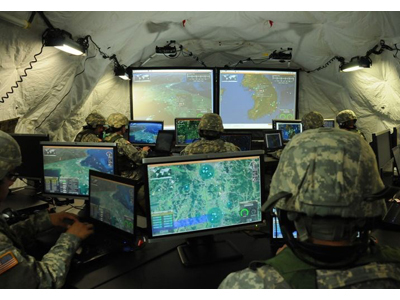The U.S. Army has awarded Northrop Grumman Corp. (NGC) a $289 million contract to continue system design and development toward fielding of the Integrated Air and Missile Defense (IAMD) Battle Command System (IBCS).
“IBCS creates a paradigm shift for IAMD, and we have proven many transformational capabilities that will be game-changers on the battlefield. IBCS maximizes the combat potential of sensors and weapons while allowing future modernization at lower overall lifecycle costs,” said Dan Verwiel, vice president and general manager, missile defense and protective systems, Northrop Grumman. “From integrating weapons developed decades ago with capabilities still in development, to rapidly adding protection against emerging threats and enabling seamless multi-domain operations, through logistics, training and lifecycle support, IBCS is solving some of the most difficult defense challenges confronting our nation and allies today. We are honored to continue working shoulder-to-shoulder with the Army to get next-generation IAMD to the warfighter.”
Under the contract, Northrop Grumman will upgrade IBCS engagement operations centers and integrated fire control network relays to enhance performance, reliability and maintainability. Northrop Grumman will also develop and deliver IBCS software version 4.5 that integrates Patriot system updates and incorporates updates for evolving threats. Among other contract deliverables, the company will provide logistics, training and support for tests, including a flight test planned for late 2019.
Recent joint warfighting exercises and soldier checkout events under dynamic, stressing threat conditions have already confirmed IBCS’ ability to: integrate radars and weapons over a vast area and efficiently and effectively maintain voice and data connectivity; consistently deliver integrated air pictures and target information with unprecedented accuracy and contribute to a Link 16 network with Navy, Air Force, Marine Corps and Army participants; enable resilient, net-centric operations as counter to electronic attacks; and provide much higher success and effectiveness handling multiple and complex engagements than existing legacy systems.
IBCS has also successfully completed flight tests and defeated live targets, having conducted an intercept on its inaugural flight test and a more difficult “engage-on-remote” on its second flight test. During its third flight test, IBCS simultaneously intercepted two threat types with two interceptor types, demonstrating command-and-control for sensors and weapons not designed to work with each other. Two more successful flight tests were conducted with Sidewinder and Longbow Hellfire missiles to support the Indirect Fire Protection Capability, validating missile integration within a few short months.
By proving disparate radars and weapons can operate as nodes in a far more effective IAMD enterprise, IBCS offers the advantages of expanded sensor and effector combinations and a component-based acquisition approach.
IBCS is the cornerstone of the Army’s IAMD modernization program. The program is managed by the Army Program Executive Office for Missiles and Space, Redstone Arsenal, Ala.

